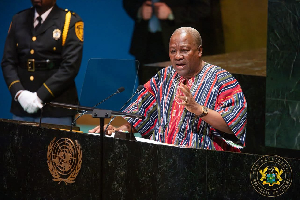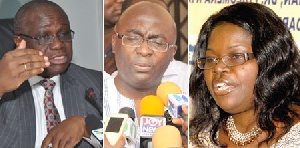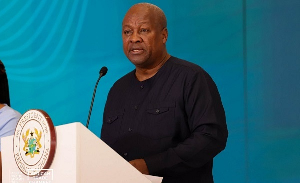The Bank of Ghana (BoG) and Ghana Statistical Service (GSS) have all surprisingly decided to keep mute over the revelations of former Deputy Governor of the Bank of Ghana, Dr. Mahamudu Bawumia, that the figures the two institutions recently put out, were not credible.
Dr. Bawumia last Thursday revealed in an article first posted on his facebook page that the statistics put out by the two institutions with respect to the Exchange Rate and Inflation fly in the face of reality.
However, many days after that damning exposé, the expected reactions from the two institutions have still not come and the two institutions have maintained a loud silence on the claims of the 2012 Vice Presidential Candidate of the NPP, which he backed with empirical evidence.
Interestingly, some government appointees with defective background in economics and statistics have elected themselves to defend both institutions.
“A look at the reported inflation numbers suggests that something is not right. The rate of increase of prices in 2014 by our collective experience is clearly the highest in recent times, underpinned by the 40% depreciation of the exchange so far this year, increases in petroleum, utility and transportation prices, etc.. The prices of most goods and services have virtually doubled and continue to increase daily.”
This notwithstanding, the Ghana Statistical service data on inflation suggests that price increases in 2014 are slower than they were last year (2013). Between January and July 2014, inflation increased by only 1.5% (13.8% to15.3%) after all the increases in petroleum, utilities and other prices we have witnessed. For the same period in 2013, inflation increased by 1.7%. This means that we were experiencing marginally faster price increases in 2013 than in 2014. Unfortunately, this data does not capture our collective experience. Almost every individual, household, business would tell you that prices are increasing much faster this year than has been observed in many years. So why is the Statistical Service data not capturing this?”
Dr. Bawumia further stated, “something is not quite right and the GSS should take another look at the numbers and procedures to make sure they are capturing price developments adequately. In response to the economic fundamentals, interest rates on the money markets have also increased significantly this year. Notwithstanding the massive exchange rate depreciation and increase in interest rates, inflation has only increased marginally. As I have pointed out before, Whenever you have exchange rate depreciation and interest rates moving in one direction and inflation appearing unresponsive to these movements, such a disconnect should be a cause for concern.”
On the Bank of Ghana, Dr. Bawumia explained that while the cedi to the dollar rate was between 3.7 and 4.1 per the interbank rates, the Bank of Ghana had interestingly pegged the rate for the last two months at 3.0.
“The Bank of Ghana (BoG) would have us believe that since June 17 this year, the exchange rate of the cedi to the US dollar has remained unchanged at some GHC 3.02 per US dollar. According to the BoG, the exchange rate has remained fixed at this rate over the last three months. A simple look at the the interbank market exchange rates indicates that the cedi has not only been depreciating daily, but is currently trading between GHC3.7 and GHC 4.1 per dollar with an average of some GHC3.8 per US dollar.
Where in Ghana today can you buy a dollar at close to GHC3.03? The large spread between the Bank of Ghana exchange rate and the interbank exchange rate indicates that the Bank of Ghana rate is being administratively set and not market driven. The BoG exchange rate is unchanged even in the face of an increase in the pipeline of demands for foreign exchange that it cannot meet. Price should normally increase when demand exceeds supply but this is not what we are observing in the BoG forex market.
It is on the basis of this fixing of the exchange rate by the BoG that the Minister of Communications (on behalf of government) claims that the cedi has only depreciated by some 22.9% in 2014 and not 40% as reported by the Financial Times of London and Reuters. This claim by the government was a rather embarrassing rebuttal because the cedi has actually depreciated by some 40% in 2014 using the interbank rates or the forex bureau rates and the whole world knows it,” he noted.
While the Bank, like the GSS has remained mute on the statements of Dr. Mahamudu Bawumia, a look at the Bank of Ghana exchange rates reveal a rather curious climb since Dr. Bawumia questioned their figures.
For over two months, the Bank of Ghana maintained that the cedi was 3.0 to a dollar, varying between 3.00 and 3.03. As at last Wednesday, a day before Dr. Bawumia’s statement, the Bank of Ghana claimed that that the cedi was trading at 3.03 to a dollar.
Interestingly however, barely two days after Dr. Bawumia questioned the rate, the Bank of Ghana rates saw a climb of over 10pesewas, with the Bank of Ghana claiming that the Cedi will trade at 3.13 to a dollar, today, Monday 25th August.
General News of Monday, 25 August 2014
Source: The New Crusading Guide
BOG, GSS mute on Dr. Bawumia’s exposé
Entertainment












